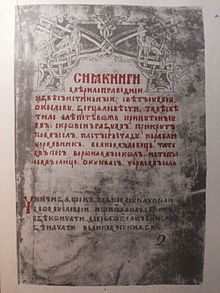Zakon sudnyj ljudem
Zakon sudnyj ljudem ( Law Book for Lay People ) is the oldest (preserved) Slavic law book. It is written in the Old Church Slavonic language and contains 32 articles with civil and criminal law provisions.
Emergence
Zakon sudnyj ljudem was created in the second half of the 9th century. There are different views of the place. Some historians consider it the oldest Bulgarian code of law, written during the reign of Prince Boris I , shortly after the adoption of Christianity (865), in Bulgaria . Others consider Moravia to be the place of origin and St. Cyril and St. Method for the authors. Linguistic reasons are given for the Moravian origin.
The text is preserved in several manuscripts from the 13th and 14th centuries, the most famous of which is Novgorodskij spisok from 1280 (Russia). The individual manuscripts differ in scope and content.
content
Zakon sudnyj ljudem is not a collection of originally Slavic legal provisions. Most of the text is based on a translation of the 17th chapter of the Eclogue , the Byzantine code of law from the 8th century. The laws were adapted and supplemented for the Slavic conditions. Some regulations were adopted from Western Roman law. Three articles - on pagan sacrifices, on the oath and on the witnesses - are based on the Mosaic Law of the Old Testament .
The main difference to the eclogue is the alleviation of corporal punishment (mutilation) and its replacement by penalties. While z. B. the eclogue for the rape of a virgin in a lonely place demands that the nose be cut off (rhinocopy), Zakon sudnyj ljudem only demands a fine to be paid to the girl. The text of Zakon sudnyj ljudem is sketchy and unsystematic; it is possibly only intended to supplement existing legal provisions.
The first article criminalizes pagan sacrificial rites and vows. The following is required: “Every property in which pagan sacrifices or vows are carried out should be handed over to the Church of God with all the property of the masters there. Those who perform pagan sacrifices and vows are to be sold with all their property and the proceeds to be distributed to the poor. "
The provisions of Zakon sudnyj ljudem provide a good insight into the social structure and level of development of Moravian society in the second half of the 9th century.
Remarks
-
↑ Five of the 32 articles do not come from Chap. 17, but from other chapters of Eclogue. There are:
- Article 3 - Distribution of the spoils of war - from Chapter 18
- Article 18 - Parents and children’s right to testify - from chap. 14th
- Article 19 - Free ransom of captured soldiers - from chap. 8th
- Article 20 - Witnesses from hearsay - from chap. 14th
- Article 30 - Disputes between spouses and divorce - from chap. 2
literature
- Ludwig Burgmann: Zakon sudnyj ljudem . In: Lexicon of the Middle Ages (LexMA). Volume 9, LexMA-Verlag, Munich 1998, ISBN 3-89659-909-7 , Sp. 470.
- Vašica, Josef: Literární památky epochy velkomoravské 863 - 885 (= literary monuments of the Great Moravian Epoch 863 - 885) . Vyšehrad, Praha 1996, ISBN 80-7021-169-5 (Czech, 340 pages). Contains the text by Zakon sudnyj ljudem with commentary.
- Minárik, Jozef: Stredoveká literatúra: svetová, česká, slovenská (= Medieval literature: World Czech, Slovak) . Slovenské pedagogické nakladateľstvo, Bratislava 1977 (Slovak).
Individual evidence
- ^ A b Vašica, Josef: Literární památky epochy velkomoravské 863 - 885 . Vyšehrad, Praha 1996, ISBN 80-7021-169-5 , p. 81-88 (Czech, 340 pp.).
- ↑ Zakon sudnyj ljudem . In: The Oxford Dictionary of Byzantium , edited in chief Alexander P. Kazhdan. New York, Oxford University Press 1991, ISBN 978-0-19-504652-6 , p. 2219 (English)
- ↑ Stanislav, JAN Starosloviensky jazyk 1: Veľká Morava a Panonia. Kultúrny jazyk a písomníctvo.Konštantín Filozof, Metod a Kliment sloviensky. Phonetics. Slovenské pedagogické nakladateľstvo, Bratislava 1978, p. 207-208 (Slovak, 371 pp.).
- ^ A b Měřínský, Zdeněk: České země od příchodu Slovanů po Velkou Moravu II . Libri, Praha 2006, ISBN = 80-7277-105-1, chapter: Zakon sudnyj ljudem a jeho ustanovení týkající se prosazování křesťanství a jeho zásad , p. 493–495 (Czech, 967 p.)
Web links
- Zakon Sudn * . Publications in the bibliographic database of the Regesta Imperii .
- Zakon sudnyj ljudem (Czech). Retrieved January 27, 2017
- Zakon sudnyj ljudem (Czech). Retrieved January 27, 2017
- Zakon sudnyj ljudem and commentary (Slovak). Retrieved January 27, 2017
